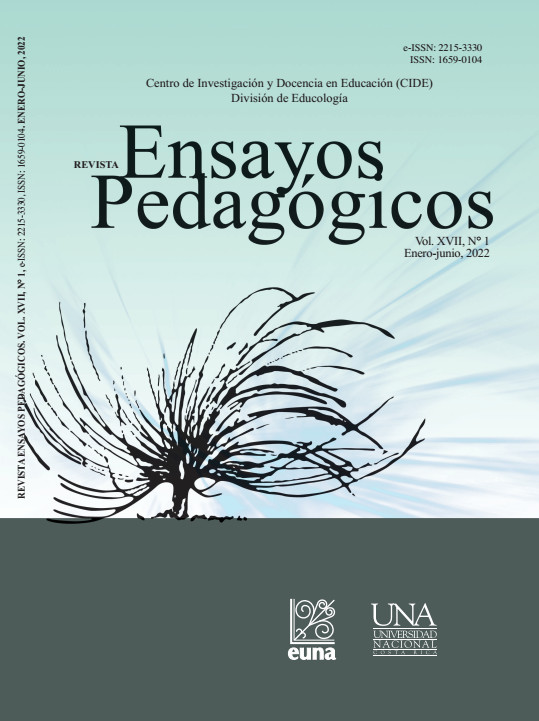Digital Educational Technologies: Market Ends or Means at the Service of Critical Learning?
DOI:
https://doi.org/10.15359/rep.17-1.1.engKeywords:
critical and transformative learning, critical education, banking education, pedagogy, educational digital technologies, face-to-face teaching, virtual learning, artificial intelligenceAbstract
This essay intends to show that digital technologies have their own goals since their creation and that some possible consequences of their indiscriminate use in education are misinformation, solipsism, loss of privacy and labor rights, the instrumentalization of reason and life, generating benefits for a few companies and business people that promote them to accumulate riches concentrated in few hands. From this reality, we propose that their use be revised so that their application does not follow parameters issued by big companies, financial entities, or neoliberal governments, that they be used critically, ethically, and politically to benefit those that have fewer opportunities, nature itself, those that are unprivileged, and social justice to reach an ethical, aesthetic, and transformative learning.
References
Benjamin, W. (1989). Discursos interrumpidos 1 [Interrupted Discourses 1]. Taurus.
Carbonell, J. (2015). Pedagogías del S. XXI. Alternativas para la innovación educativa [Pedagogies of the 21st century. Alternatives for educational innovation]. Octaedro Editorial.
Daum, T. (2019). El capitalismo somos nosotros: crítica a la economía digital [We are capitalism: Criticism to global economy]. Uruk Editores.
Espinosa, E. (2017). Hacia una pedagogía de la diversidad: pensar diferente en la escuela [Towards a pedagogy of diversity: Thinking differently at school]. Repique, 1, 145-157. https://1library.co/title/hacia-pedagogia-diversidad-pensar-diferente-escuela
Fromm, E. (1965). El miedo a la libertad [Fear of freedom]. Paidós.
Freire, P. (2005). Pedagogía del oprimido (segunda edición) [Pedagogy of the Oppressed (2nd Ed.)]. Siglo XXI.
García, M., & García, J. (2012). Filosofía de la Educación. Cuestiones de hoy y de siempre [Philosophy of education: Matters of today and always]. Narcea.
Gómez, J., & Mora, M. (2011). Pedagogía del futuro. Educación, sociedad y alternativas [Pedagogy of the future: Education, society, and alternatives]. Revista Ensayos Pedagógicos, número especial. http://hdl.handle.net/11056/19783
Habermas, J. (1987). Crítica de la razón comunicativa II: Crítica de la razón funcionalista [Criticism to communicative reason II: Criticism to functionalist reason]. Taurus Humanidades.
Han, B. C. (2014). Psicopolítica [Psychopolitics]. Herder.
Herrera, J. (2010). Manifiesto inflexivo: 10 ideas para construir una cultura radical de paz y derechos humanos [Inflexive manifest: 10 ideas to build a radical culture of peace and human rights]. Revista Praxis, 65-64, 11-21. https://www.revistas.una.ac.cr/index.php/praxis/article/view/4021
Hinkelammert, F. (2006). El sujeto y la ley, El retorno del sujeto reprimido [The subject and the law: The return of the repressed subject]. Caminos.
Horkheimer, M. (2003). Teoría Crítica (tercera edición) [Critical theory (3rd Ed.)]. Amorrortu Ediciones.
Orlowski, J. (Director) (2020). El Dilema de las Redes Sociales [Documental] [The dilemma of social networks] [Documentary]. Netflix.
Pinar, W. (2014). La teoría del currículo [Theory of curriculum]. Narcea.
Rendeules, C. (2020). Byung-Chul Han: “El dataísmo es una forma pornográfica de conocimiento que anula el pensamiento” [Byung-Chul Han: “Dataism is a pornographic form of knowledge that nullifies thinking”]. El País. https://elpais.com/cultura/2020/05/15/babelia/1589532672_574169.html
Rodríguez, W. (2011). Aprendizaje, desarrollo y evaluación en contextos escolares: consideraciones teóricas y prácticas desde el enfoque históricocultural [Learning, development, and assessment in school contexts: theoretical and practical considerations from the historical-cultural approach]. Revista Electrónica Actualidades Investigativas en Educación, 11(1), 1-36. https://revistas.ucr.ac.cr/index.php/aie/article/view/10168
Rose, H., & Rose, S. (2017). ¿Puede la Neurociencia cambiar nuestras mentes? [Can neuroscience change our minds?] Morata.
Torres, J. (2017). Políticas educativas y construcción de personalidades neoliberales y neocolonialistas [Educational policies and the construction of neoliberal and neocololinalist personalities]. Morata.
Vygotsky, L. (1968). Pensamiento y lenguaje [Thought and language]. Edición Revolucionaria.
Žižek, S. (2009). Sobre la violencia. Seis reflexiones marginales [About violence. Six marginal reflections]. Paidós.
Downloads
Published
How to Cite
Issue
Section
License
Ensayos Pedagógicos is subscribed to the Attribution-NonCommertial-NoDerivatives 4.0 International Creative Commons Licence, which allows both authors and readers to freely download, store, copy, and distribute the final approved publisehd version of the manuscript (post-print) as long as this is done without commercial purposes, no derivative works are generated, and the source and author are mentioned. As well, Ensayos Pedagógicos declares that authors will remain the rightful owners of the copyrights of their work in perpetuity.







